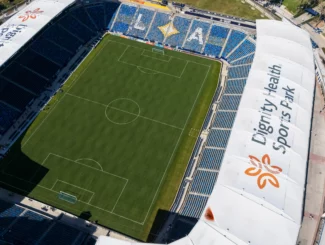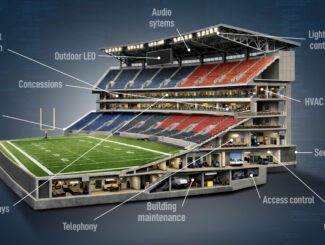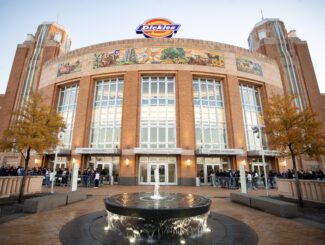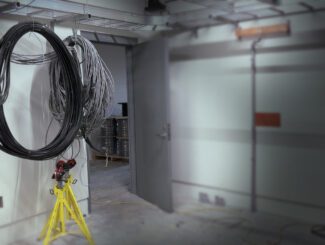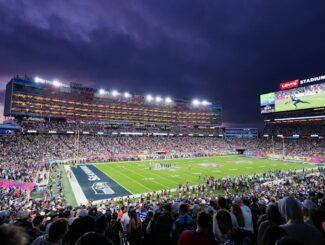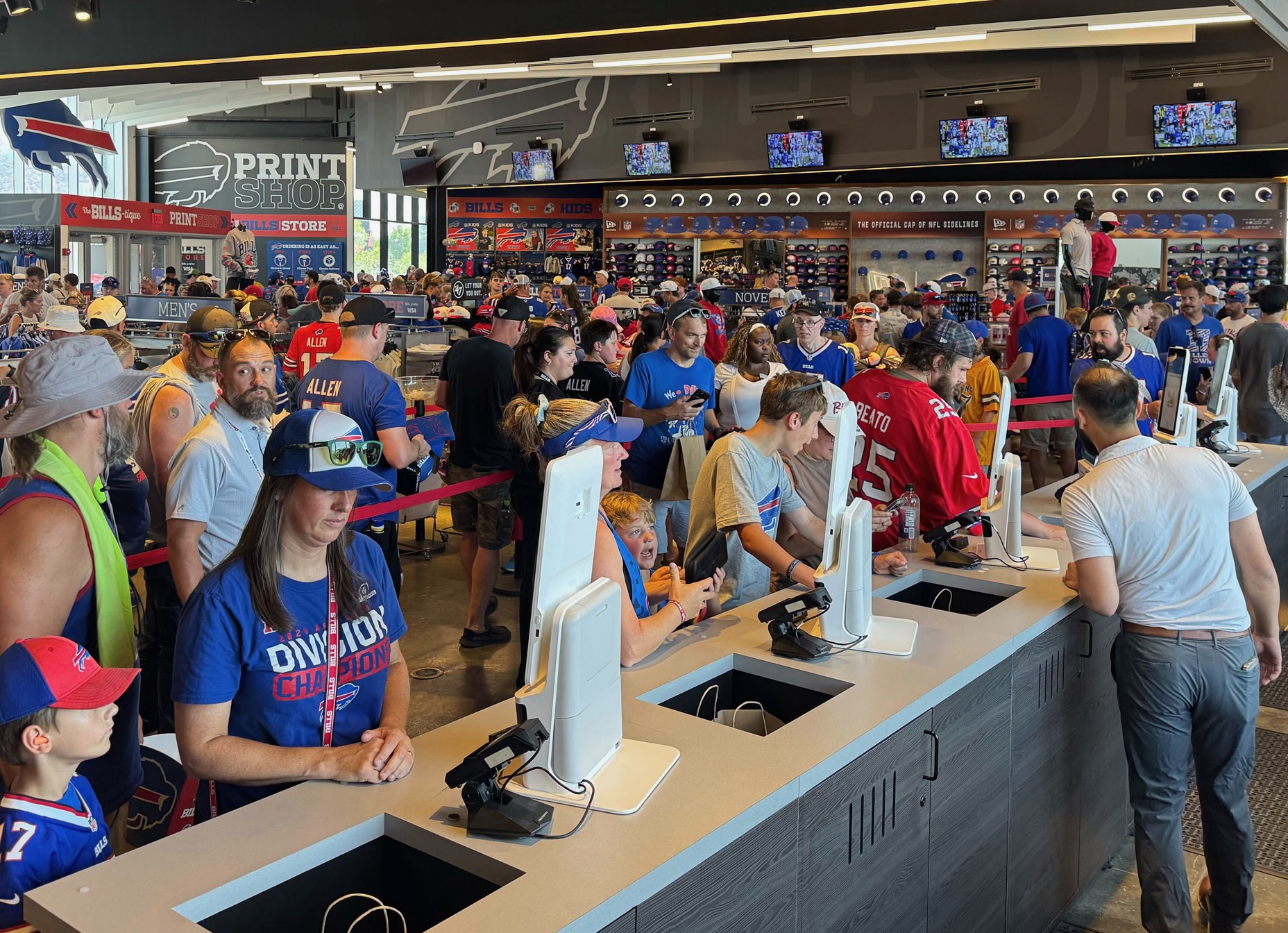
A new use of an old wireless technology is creating a revolution in the stadium merchandise-store world, as self-checkout systems using radio frequency ID (RFID) sensors from a company called EXO Checkout are being installed at numerous large U.S. sports venues in rapid fashion.
With a seemingly simple product — a sort of sink-looking bin lined with RFID sensors — EXO Checkout has figured out a way to reduce average merchandise-store transaction times from several minutes to 30 seconds or less. Its system allows fans to quickly check out any product by just placing it in the bin, where sensors scan the RFID tags affixed to the merchandise. Items and prices are then displayed on a linked payment device, where fans can quickly pay for their purchases.
Though some major retailers have also been using RFID-powered checkout systems, normal retail stores don’t typically have the line pressures seen at stadiums or at major events, like big-name concerts where merch lines can cause hours-long waits to purchase items.
In addition to virtually eliminating the historic long lines at stadium merch stores, the EXO Checkout system also provides back-end benefits like faster, more accurate inventory counts and integrated loss prevention, allowing it to check off just about every ROI box a venue retail operator might have. The relatively inexpensive systems, which are also available in a version on wheels for flexible deployments, can be deployed quickly, needing only power and an Ethernet connection to work.
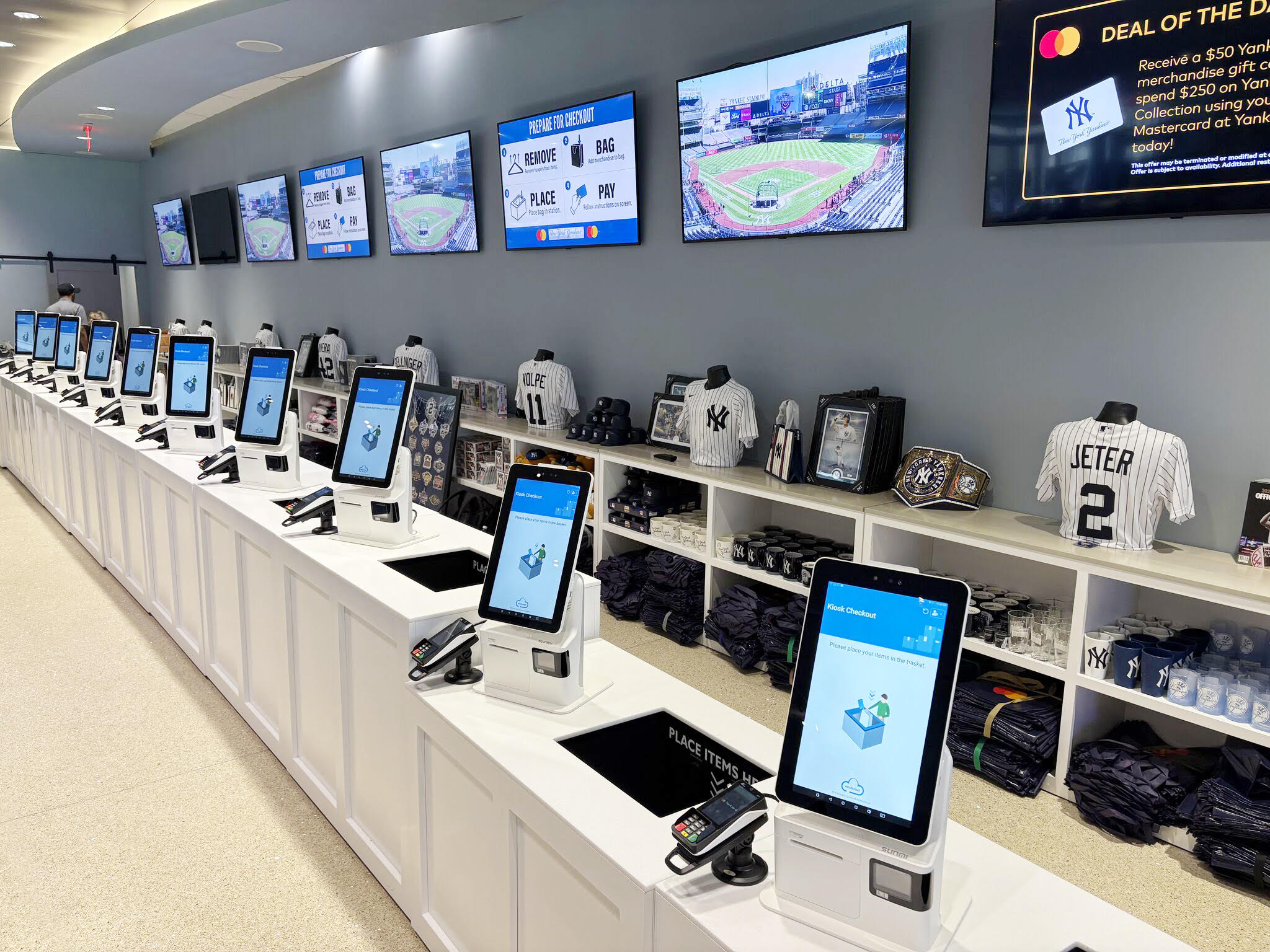
The double-digit sales increases and staff-repurposing ability of the new systems have helped EXO Checkout rapidly sign up an impressive list of venue customers, including the New York Yankees, the Dallas Cowboys, the San Francisco 49ers, the Buffalo Bills, the Tennessee Titans, the New York Mets, the Detroit Lions, the Baltimore Ravens and the Cincinnati Reds, as well as events including the most recent NFL Super Bowl, the Kentucky Derby and the NBA and WNBA All-Star Games.
Since its first public installation of EXO Checkout at the New York Islanders’ merchandise store at the opening of UBS Arena in 2022, the EXO Checkout systems are now a favored technology for large venue retail operators, including Fanatics and Legends. According to Lance Burnett, CEO of EXO Checkout parent company Stark RFID, EXO Checkout systems have registered well over a million transactions, and are now live in 24 U.S. professional sports arenas and stadiums. According to venue store operators, sales at stores using the EXO Checkout systems are seeing double-digit increases compared to older methods of checkout.
“I’m shocked at how it’s jumped the business,” said Mike Loparo, executive vice president of special projects at key accounts for Legends Global, said of the EXO Checkout systems. Loparo, who oversees the Legends retail operations at Yankee Stadium, said the EXO Checkout technology deployed there this year is already delivering double-digit percentage sales increases, while completely eliminating checkout lines, among other benefits.
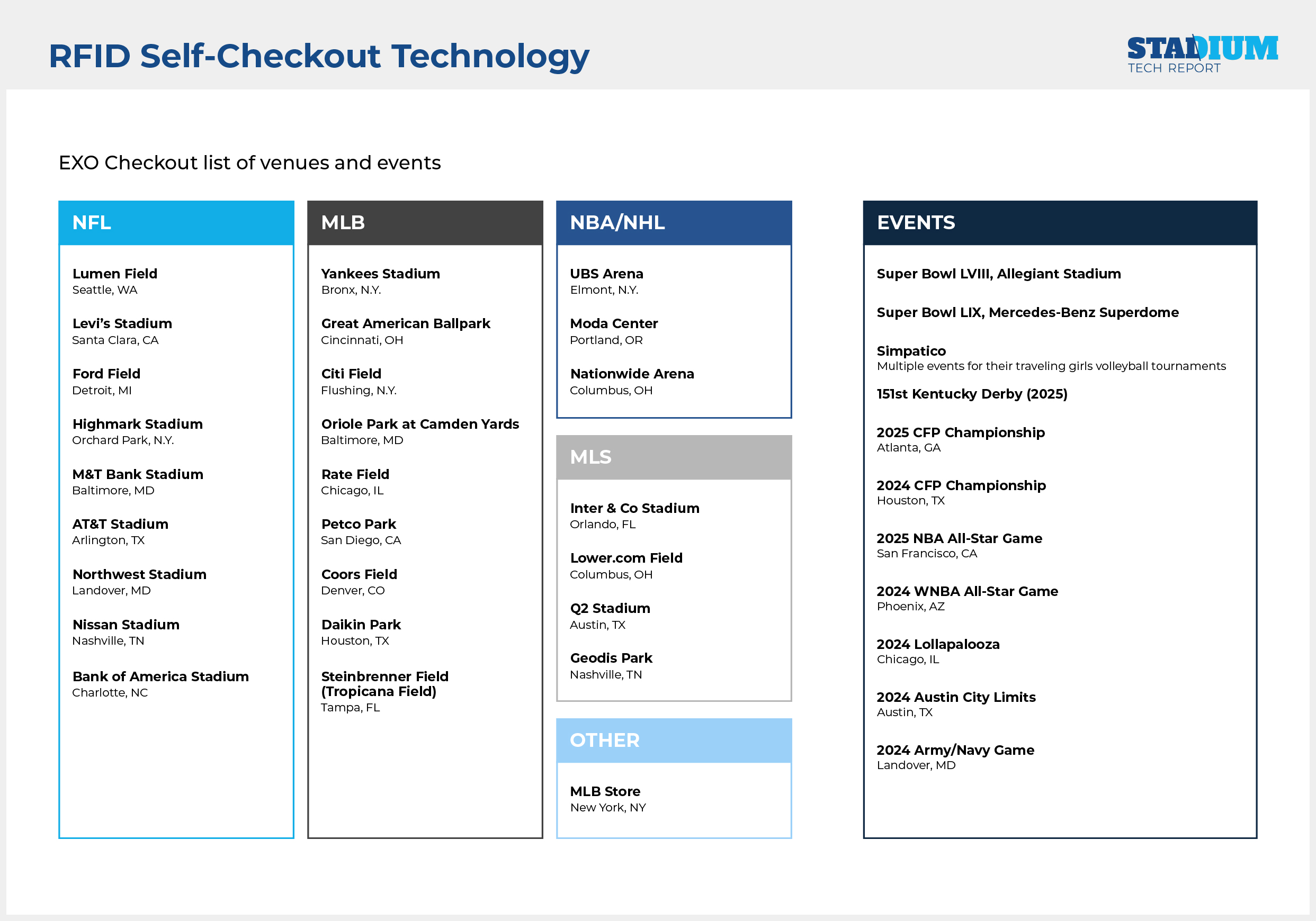
“The EXO system really pulls on all the operational levers,” said Charles Delgado, chief operating officer for venue retail at Fanatics, which now has 15 separate venue deployments of EXO Checkout technology. “It’s not a question of if you should use this. It’s a question of why are you not using it already.”
RFID and the twist by EXO Checkout
If you need a refresher on what Radio-Frequency Identification is, here’s a definition from RFID manufacturer Avery-Dennison: RFID is a wireless technology that uses radio waves to identify and track objects by placing an RFID tag or transponder on them. The tag contains a microchip and an antenna that transmits a unique identifier to a reader device when prompted by the reader’s radio signal. This technology allows for non-contact, non-line-of-sight identification and tracking of items.
While RFID has been around for decades, its use has been mainly for applications like security badges, ski passes, and inventory control. For consumers, perhaps the most common historical interaction with RFID was with the clunky plastic security tags that were clipped onto clothes and other store items, which needed to be removed by staff with a special separator.
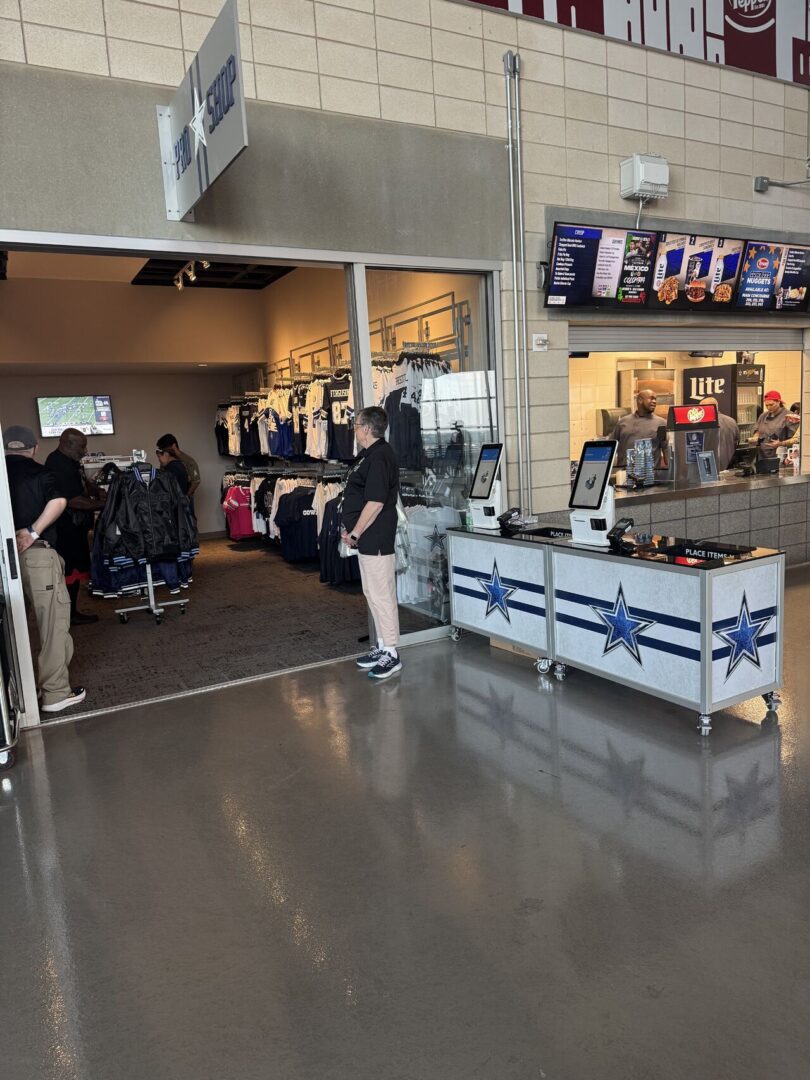
In 2004, Burnett founded Stark RFID in Greenville, S.C., mainly to build RFID inventory control systems designed to track finished goods in harsh, industrial environments. In 2010, Burnett said Stark expanded into the sports and entertainment market, using RFID and other technologies for access control, asset tracking, and to track fan movements.
If there is one big thing that has changed since the department-store security days, it’s that RFID chip and antenna technology has advanced incredibly, with tags now small and thin enough to be printed and taped onto price tags. The lower cost (estimated at around four cents a tag by industry watchers) and mobility opened up more markets for the tags to be used for inventory control. But according to Burnett, the big change for his company came when a sports customer asked if the process could be turned around, using the RFID tags to power a self-checkout process.
“We took that idea and turned it into a product,” said Burnett, a system that is now basically a bin or bucket that is mounted either into a stationary counter, or in a portable “counter on wheels.” With RFID scanners inside the bin walls and other sensors to detect when something is put in the bin (to turn the scanners on), Stark RFID came up with a big winner for stadium merchandise store checkouts.
Instead of the historic process of having a staffer sort through and individually scan a bar code on each item, a store that tags all its merchandise with an RFID label can now just let the customers take what they want, dump it in a bin (they can even put items into a bag before doing so), see the total and pay on the attached device, and they are done.
After the public debut in the team store at the Islanders’ new home, firms like Fanatics and Legends quickly stood up some trial operations of devices, now called EXO Checkout systems after Stark RFID spun the business out as its own entity. According to the company the name comes from the phrase “EXpedited checkOut,” which just became EXO and then EXO Checkout.
Legends’ Loparo said his company tested the systems at the two most recent Super Bowls, events where merchandise sales are heavier than normal. Fanatics, Delgado said, stood up a test at the Major League Soccer stadium in Orlando, Fla. When both companies’ tests passed with results almost too good to believe, they both went ahead with plans to deploy systems as fast as possible.
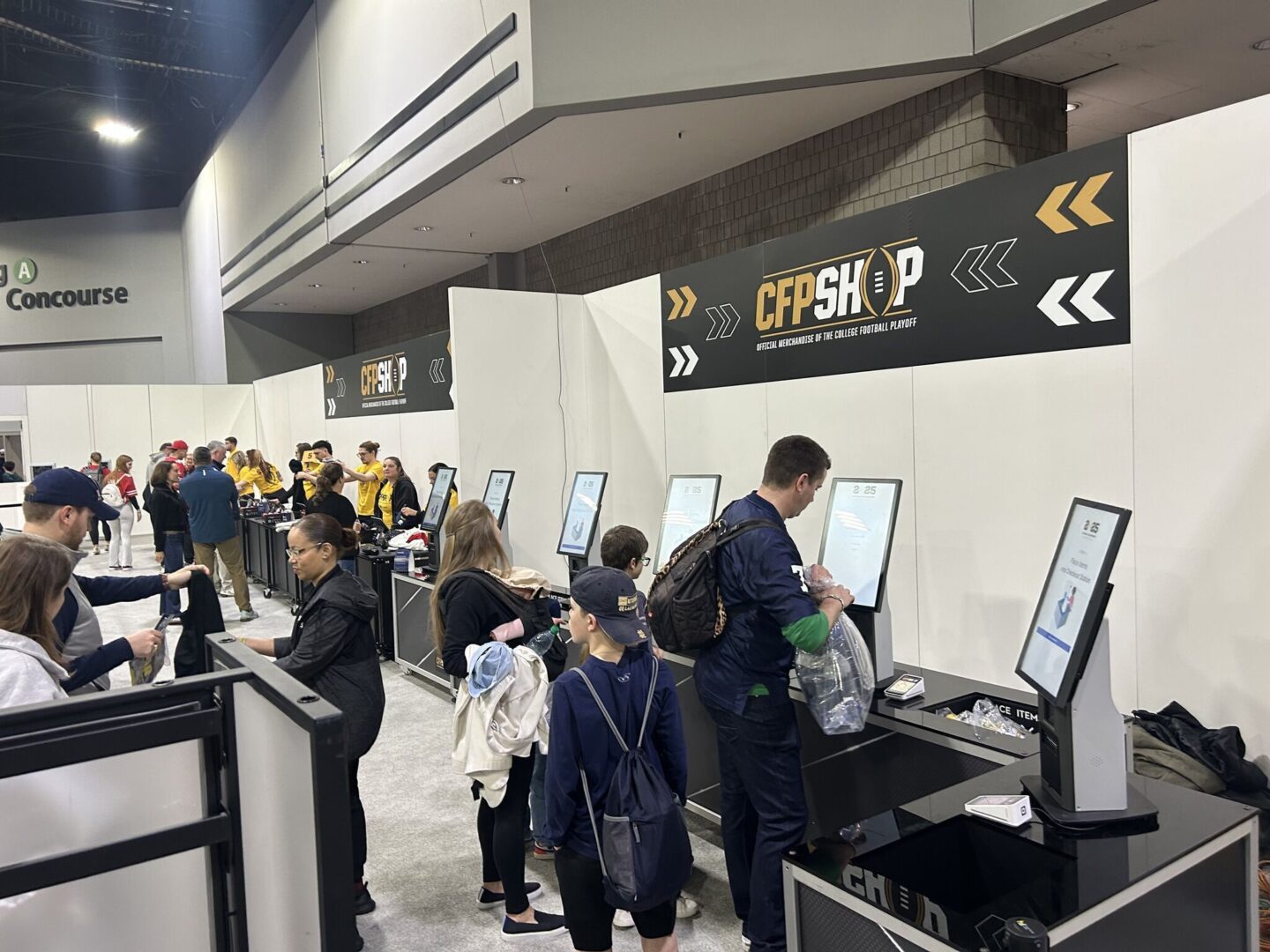
EXO Checkout bins aren’t particularly costly, and store operators have several different choices when it comes to obtaining the gear.
“EXO makes it easy to purchase — there’s a traditional capex/opex model, a per-transaction model, or a leasing option,” Burnett said.
The low cost and easy deployment — according to Delgado, Fanatics now has its own EXO Checkout installation team that can stand up a new store in 48 hours — has led many venues and events to install numerous systems to help eliminate the lines that used to paralyze stadium merchandise purchases.
According to Legends’ Loparo, the 13 EXO Checkout systems at the main Yankee Stadium team store that were installed before the start of the 2025 season can process an entire merchandise transaction at an average of 27 seconds — as opposed to the 3-to-4 minutes for a staff-assisted checkout done the previous way.
“That’s 27 seconds, paid and out the door,” Loparo said. With just a short window for merchandise sales (usually before the start of a game), Loparo said the Yankee Stadium store used to get so crowded that “people wouldn’t go anywhere near it because you couldn’t get in.”
Now with EXO Checkout, he said the store doesn’t really have a line but instead a moving process of customers quickly checking out and leaving.
“It’s just amazing,” Loparo said. “We’re looking to see how fast we can get these things in other stadiums.” Legends Global manages the merchandise sales at AT&T Stadium, Highmark Stadium and the College Football Playoff, all of which use the EXO Checkout systems.
Fanatics, Delgado said, also has an aggressive plan for more EXO Checkout deployments at the properties it manages.
“There’s a ‘wow’ factor to it as well,” Delgado said, claiming that fans see the checkout system as something fun and and a positive addition to the overall game-day experience.
Staffing and inventory benefits
With a hot product on his hands, EXO Checkout’s Burnett can only laugh sometimes at how the system sells itself, especially when the side benefits of the fast checkout include the ability to repurpose store staff and to process inventory more quickly and accurately.
“When we discuss ROI with stadium executives we tell them they’re not going to believe it,” Burnett said. “But our customers are telling us they’re paying for the systems by the second event.”
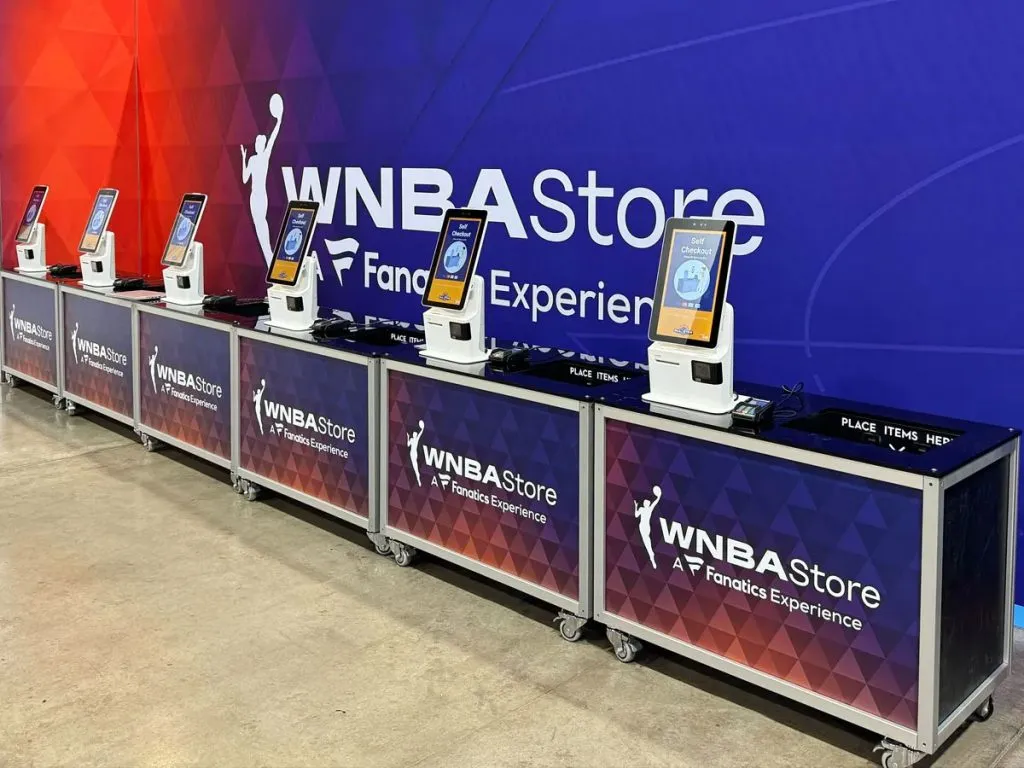
Legends’ Loparo said that because only a few staffers are needed to monitor multiple bin stations, other employees can now be sent out into the store to assist customers.
“Instead of being trapped behind a counter I can now send staff out to help people with hat sizes,” Loparo said.
And with all the merchandise in a store (or storeroom) now tagged with RFID, venue operators can do inventory with RFID “guns” that allow for extremely accurate product counts in minutes, instead of hours. Loparo said initially he didn’t believe the inventory system would work as promised, and even did a comparison of RFID wanding to a human hand count — and found the RFID system was not only faster, but far more accurate than a hand count.
“I almost didn’t believe it could work,” Loparo said. “But now for inventory, you take a gun and boom, it’s done. It’s a huge time saver.” EXO Checkout can also install a traditional loss-prevention system, using the RFID tags to alert if an item is headed out the store doors without payment.
And instead of just stopping and accusing a customer, Fanatics’ Delgado said that with the EXO Checkout system an employee can see the exact item on a tablet, and can simply ask the customer if they knew they didn’t pay for it — making it more of a customer-service interaction than a policing one.
Having fast accurate inventory also lets venues know what products are selling quickly, and what needs to be restocked, Delgado said. “It’s an incredible increase in the value of information provided,” he added.
Challenges: Product tagging and RFID system competition
If there is still a hurdle to the EXO Checkout revolution, it is the fact that every item in a merchandise store using the technology needs to be tagged with an RFID tag, and then synchronized with the venue’s point of sale (POS) platform. Seeing both as possible major hurdles, Burnett said EXO Checkout worked hard to make the systems compatible with all the leading venue point-of-sale (POS) platforms, and to convince as many product suppliers as possible to pre-tag items with RFID tags.
Though many merchants are already delivering RFID-tagged gear, it’s not a 100 percent compliance, meaning that venues must still do a lot of hand-tagging before an item can be sold. But all involved believe that most major apparel suppliers will follow the lead of companies like Nike and New Era, and not just for stadium stores but for major retailers who are likely to adopt the technology sooner rather than later. The Japanese retailing giant Uniqlo, in fact, already uses similar self-checkout bins at some of its stores.
“More and more firms are tagging products every day,” Burnett said. “It’s rare to find one that isn’t doing it.”
While there is some competition in the field of using RFID for stadium merchandise stores, none of the other players has anywhere near the penetration that EXO Checkout already has.
Amazon, which introduced a version of its “Just Walk Out” store using RFID scanning gates at the store exits a couple years ago, still only has a few stadium installs, though it has also shown versions of a mobile format on recent LinkedIn posts. And while the opening last year of the Los Angeles Clippers’ new home Intuit Dome featured merchandise stores that used RFID in conjunction with camera technology for a checkout-free experience, that system (which uses checkout-free technology from AiFi and RFID technology from a company called Invento) has not been deployed at any other venue that we are aware of.
But to make any headway, those firms will have to compete not just with EXO Checkout’s technology, but also with the company’s growing reputation for service. Both Legends’ Loparo and Fanatics’ Delgado had nothing but high praise for EXO Checkout’s product support, which includes extensive on-site and game-day assistance.
“They [EXO Checkout] bring in the army on game day, and they work well with our IT department,” said Legends’ Loparo. “They’re more personal, more involved and they understand all the logistics.”



